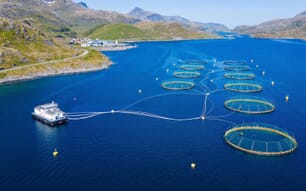
Golam Kibria Ripon is successfully continuing his shrimp production and trading activities, despite the pandemic-related disruptions © Mahfujul Haque and Ben Belton
To address this objective, the project team is undertaking a comprehensive survey of fish and shrimp farmers in southern Bangladesh. Pretesting and refining draft questionnaires is a key element in the research design. Though the team planned to conduct questionnaire development through face-to-face meetings in Bangladesh, this proved impossible due to Covid-related travel restrictions. With quick planning and innovative thinking, the partners successfully adapted their plans and conducted the questionnaire drafting through a series of virtual meetings, explain the Fish Innovation Lab's Mahfujul Haque and Ben Belton in a press release issued this week.
Investing proves a success
One of the farmers they interviewed was Golam Kibria Ripon, who is successfully continuing his shrimp production and trading activities, despite the pandemic-related disruptions.
“The only thing I do and the only thing I know is shrimp culture. Whatever the situation is, I have to continue as many people depend on my business for their livelihoods,” Ripon told the project leads.
Ripon is a successful shrimp farmer and trader who has engaged in the aquaculture business since 1996. His business employs about 20 full-time staff, including five women.
He noted that the pandemic has led to major disruptions in the shrimp business for the first time in his career. In response, he hired 10 temporary staff to deliver the post-larvae to farmers during the pandemic, after nursing the shrimp fry himself, and began to deliver harvested shrimp to the processing plant with his own vehicle.
“Now I know how to cope and survive in an extreme situation. The demand of shrimp will not decrease, [and] all I have to do is to make sure to transport the harvested shrimp to the processing plant,” Ripon reported.
Ripon ensures the health and safety of his staff by providing proper sanitising facilities in his farms and maintaining basic preventive procedures.
How to engage effectively with farmers
The researchers explain that one of the major challenges was how to pretest the questionnaire with the farmers in the field, particularly with shrimp farmers in the remote Khulna region like Ripon.
To cope they invited Ripon to attend a virtual meeting for pretesting the questionnaire. Although he was unfamiliar with the videoconferencing application, the Machine Learning for Better Aquaculture team was able to quickly teach Ripon how to use it so that he could participate in a questionnaire interview that lasted about three hours.
Conducting the interview remotely allowed for researchers based in the US and Bangladesh to meet with Ripon and continue progress on the research that will benefit shrimp farmers across southern Bangladesh. The questionnaire was translated from English to Bangla for better communication prior to the interview.
“I think this research will identify our problems, such as shrimp disease and disappearance of stocked post-larvae that affect our farming, and according to the nature of problems we will find a proper solution from the researchers,” said Ripon. “I am the General Secretary of Paikgacha Shrimp Farmers Association. I can organise the shrimp farmers of my locality to receive advanced training on shrimp farming, disease management, and other topics though the Zoom platform. Moreover, we have a big Facebook group, which we can use to share any useful information among the shrimp farmers.”
According to the researchers, "the participation of a very knowledgeable shrimp farmer early in the research process provided a significant boost to questionnaire design and helped the project to meet its milestones on time, despite disruptions linked to Covid-19. This successful experiment in pretesting a questionnaire with a farmer in a remote area indicates possibilities for conducting other project activities, including workshops and information dissemination activities, virtually if Covid-19 continues to make travel or face-to-face meetings difficult."



